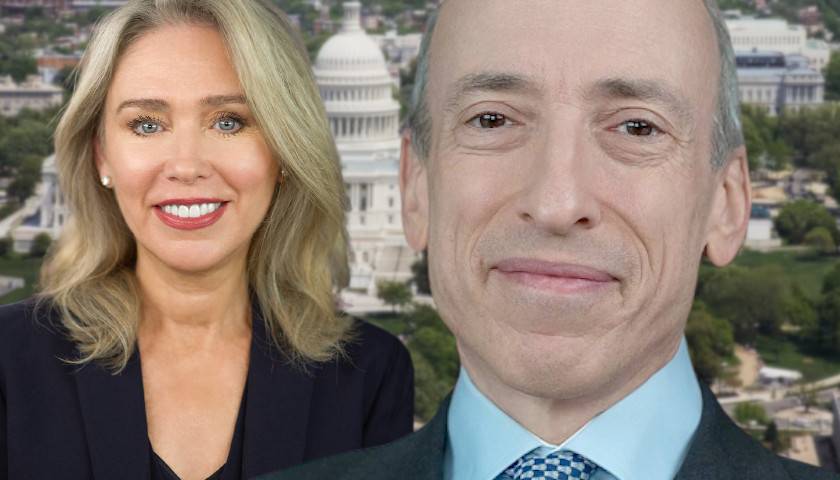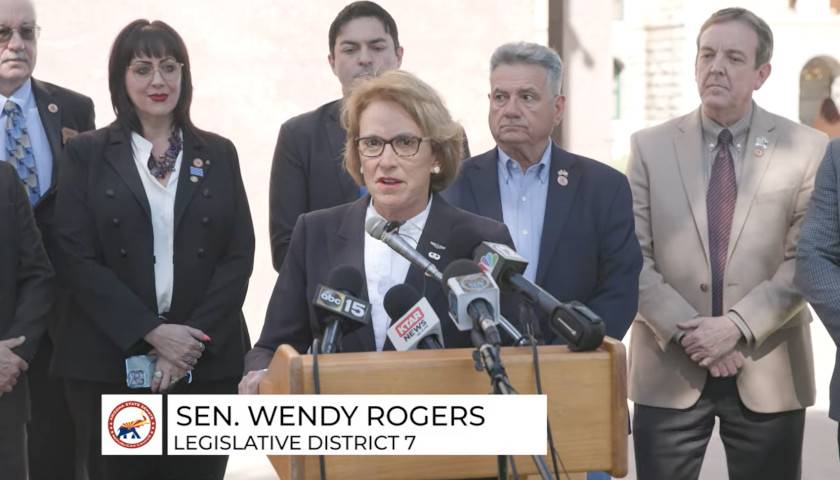by Kevin Mooney
Washington’s revolving door is getting a fresh green paint job: Federal architects of a controversial new rule requiring businesses to measure their carbon footprints throughout their supply chains have joined a start-up company poised to reap millions by performing those calculations.
At least three ranking Securities and Exchange Commission officials have joined Persefoni, a company formed in 2020 for the purpose of measuring such footprints of large business enterprises.
Documents show that the SEC relied on input from the for-profit company to draft the proposed rule. Some critics argue that the estimates from Persefoni low-balled the price tags unrealistically for such accounting to make them more politically palatable.
Persefoni, billing itself as “The Platform for Carbon Accounting – Built For Climate Disclosure,” and similar outfits are emerging as their own service industry as they stand to profit from the new rule, since most companies do not have the staff or expertise to calculate their carbon footprints.
While environmentalists have hailed the rule as an important step in forcing companies to grapple with their impact on the climate by exposing it to the public, critics argue that it goes far beyond the SEC’s core mission of protecting investors. In voting against a draft of the proposal, SEC Commissioner Hester Peirce, a Trump appointee, said it “forces investors to view companies through the eyes of a vocal set of stakeholders” – as opposed to traditional shareholders – “for whom a company’s climate reputation is of equal or greater importance than a company’s financial performance.”
The SEC and Persefoni each declined to comment for this article.
Persefoni appears to have had great influence over the proposed rule. Public records from the SEC show the commission held six meetings with representatives from Persefoni and Ceres – a prominent investor advocacy group that supports such climate disclosure – from September 2021 to June 2022. These include:
- Meetings on Sept. 14, Nov. 23, and Nov. 30 between Persefoni and the SEC office of the chair, Gary Gensler (pictured above, left);
- Meetings on March 28 and April 5 between Ceres and the Office of Commissioner Allison Herren Lee (pictured above, right);
- And one joint meeting involving Persefoni, Ceres, and ERM with the SEC’s Division of Economic and Risk Analysis, the Division of Corporation Finance, and the Office of the Chief Accountant.
Lee, a Democrat who joined the SEC as a staff attorney in 2005, was appointed by President Trump as one of the SEC’s five commissioners in 2019 – filling a Democratic vacancy on the commission, which was structured to be nonpartisan. President Biden named her as acting chair in 2021, and she took charge of the public comment period for the proposed rule.
Lee stepped down on March 15, 2022, just six days before the commission unveiled its proposed climate rule. In May 2023, she joined Persefoni as a member of the firm’s “sustainability advisory board.”
At Persefoni, she reunited with Kristina Wyatt, who joined the company’s board in March 2022. Previously, Wyatt had served the SEC as senior counsel for climate and environmental, social, and corporate governance (ESG). In this capacity, she worked directly on developing the proposed rule. Wyatt was also listed as the direct contact when the commission circulated a request for information from the public regarding climate-change disclosures.
In December 2022, Persefoni hired another SEC alum, Emily Pierce, to serve as associate general counsel and vice president of global regulatory climate disclosure.
By all accounts, the SEC leaned heavily on Persefoni’s cost-benefit analysis of the pending rule, which essentially establishes a parallel disclosure regime for the SEC – all in the name of mitigating climate change.
The SEC proposal has many parts, but the most controversial and cumbersome involves the requirement that larger companies must provide soup-to-nuts calculations of their carbon emissions, including those from thousands of their suppliers operating across hundreds of countries.
As RealClearInvestigations has previously reported, to come up with numbers for Cocoa Puffs cereal, General Mills might have to calculate the emissions from “cocoa farms in Africa, corn fields in the U.S., or sugar plantations in Latin America. Then thousands of processors, transporters, packagers, distributors, office workers, and retailers join the supply chain before a kid in Minnesota, where General Mills is based, pours the cereal into a bowl.”
Since most of the emissions that must be measured are not directly generated by the companies, the calculations amount to a herculean task. This is where an outfit like Persefoni comes in.
When the commission first published its proposal in March 2022, it provided corporate compliance cost estimates that ranged from $460,000 to $640,000 during the first year. Accurate estimates are crucial for companies to determine if they are equipped to comply. But there is considerable doubt on that front.
Persefoni stands out as the only source that provides any estimate anywhere close to the SEC’s $640,000 figure, for which the commission does not provide any citations or methodologies to show how it arrived at its estimates. Persefoni is cited within the proposal nine times, but the firm is not cited in connection with the SEC’s stated ranges for compliance costs on page 373. In fact, no source is cited or linked as a resource for the SEC’s figures.
Rupert Darwall, an author and energy policy analyst affiliated with the libertarian Competitive Enterprise Institute and a senior fellow at the RealClearFoundation, has been critical of what he views as a lack of transparency and accountability on the part of the SEC, which gives cover to outside partners that stand to gain once the rule takes effect.
“Persefoni has a glaring conflict of interest in low-balling cost of compliance estimates to the SEC, which the SEC should have disclosed and been mindful of. Instead, the SEC put undue weight on these implausibly low estimates,” Darwall said. Estimates of indirect emissions across supply chains “are especially risky for filers as there’s no limiting principle and, contrary to longstanding accounting principles, multiple companies account for the same emission.” Darwall also makes the point that Persefoni’s low-cost estimates are “at odds of what it’s been telling investors about the revenues it projects from the rule.”
In early 2022, the carbon accounting firm partnered with the environmental activist group Ceres to commission from consulting firm ERM a compliance cost study, which was published in May 2022. This is where Persefoni produced estimates in line with the SEC’s $640,000 figure. That same month, Persefoni submitted a comment letter in response to the SEC proposal, which included its joint study with Ceres.
Although the letter is dated May 20, 2022, the SEC did not publish it until the final week of the comment period ending June 17, 2022, curtailing the period for public scrutiny of the Persefoni estimates.
With Persefoni’s letter intermixed with roughly 1,140 other comments, some saw this as an effort to bury the firm’s relationship with the SEC.
One critic is Bonner Cohen, a senior fellow with the National Center for Public Policy Research in Washington, D.C.
“The collusion between the SEC and a select group of outside parties gives new meaning to the term climate cartel,” Cohen said in an interview. “Not only is there a hand-in-glove relationship between the SEC and outfits like Persefoni, Ceres, and ERM that stand to benefit financially from the climate disclosure rule the agency is set to release. They also appear to have had a hand in drafting that rule. The SEC and its cronies are so closely entangled that they are effectively acting as one.”
Knowing Which Way the Windfall Blows
While the SEC and Persefoni would not comment for this article, Steven Rothstein, managing director of the Ceres Accelerator for Sustainable Capital Markets, told RCI that there is not any conflict of interest at work. He pointed out that Ceres has been advocating for a climate disclosure rule with the SEC for the past two decades.
“The U.S. Securities and Exchange Commission received 15,000 public comments around this rule,” Rothstein said in an email. “Among the most comments than any in the SEC’s 90-year history. Everyone has a vested interest in the future of their investments and retirement savings. The comments will make the final rule stronger and more robust. The investment community is overwhelmingly supportive of more climate information as a way to reduce material financial risk.”
Persefoni executives have not been reticent to discuss the windfall they expect to experience if the rule is finalized. Speaking to CNBC in March 2022, Kentaro Kawamori, the firm’s CEO, discussed the advantages that would likely accrue from having a software platform that enables companies to analyze, manage, and account for their carbon footprint. Kawamori draws a comparison with Salesforce, the cloud-based software company headquartered in San Francisco.
“You’re going to have a Salesforce-type of success,” he said. “Just like Salesforce created the system of record for the customer record, companies like us – you will have one or two big winners – will create a system of record for the carbon accounting piece.”
Persefoni’s Chief Sustainability Officer, Tim Mohin, went even further, telling Politico that larger companies will almost certainly need outside help to comply. “Really they have a very short runway to get their act together,” he said. “We’ve gotten lots of calls from these large companies saying, ‘Tell us about what you do and how we can work with you.’”
Mohin went on to describe Persefoni as the “TurboTax of greenhouse gas reporting.”
As it stands, Persefoni is already doing pretty well. On Oct. 28, 2021, Persefoni announced a $101 million raise in its Series B financing round with its long-time investor, NGP Energy Technology Partners, returning to participate. But the oversized influence Persefoni apparently has been exerting within the SEC is beginning to attract congressional interest.
In June, House Oversight Committee Chair James Comer (R-K.Y.) and Senate Banking Committee ranking member Sen. Tim Scott (R-S.C.) sent a joint letter to the SEC requesting documents and information, including “all nonpublic records referring or relating to the climate consultancy, climate accounting, or sustainability-related organizations Persefoni, Ceres, ERM, or South Pole since January 20, 2021.”
As for the rule itself, Cohen, the policy analyst with the National Center, sees “an effort by the SEC and its climate-cartel cronies to fashion a climate accounting standard to fit the inherently amorphous notion of a carbon footprint.”
He continued: “Companies will have to disclose their ‘climate impacts’ in accordance with the SEC’s purely arbitrary requirements. The arrangement will put more power into the hands of the SEC, enrich the likes of Persefoni, and condemn regulated businesses to climate serfdom.”
– – –
Kevin Mooney is a contributor to RealClearInvestigations.





